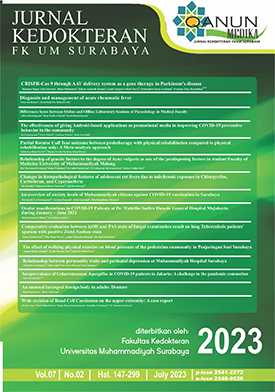An overview of anxiety levels of Muhammadiyah citizens against COVID-19 vaccination in Surabaya
Abstract
Since the publication of PERMENKES Number 10 of 2021 on the implementation of vaccinations in the context of the COVID-19 pandemic, the community, particularly Muhammadiyah residents, has responded. Most Muhammadiyah residents do not have anxiety about COVID-19 vaccination because people are starting to realize the importance and benefits of vaccination. Even though vaccination activities have been going on for a long time, there are still people who feel anxious about the COVID-19 vaccination. The anxiety experienced by respondents is a natural thing because the current pandemic is a new type of disease that has never been experienced before. Numerous media outlets produce a lot of news that has the potential to change how the public feels about vaccines. Anxiety can be brought on by the general public's poor impression of immunizations. The process of immunizing will be hampered by the onset of fear. The study aimed to describe the amount of COVID-19 vaccination-related anxiety among Muhammadiyah inhabitants in Surabaya. This study, a descriptive study with 100 respondents, used probability sampling using a stratified random sampling technique. The DASS-42 questionnaire was utilized as the data-gathering tool. The findings revealed that 77 persons (77 percent) and 23 people did not experience any abnormal levels of vaccination fear (23 percent). According to the study's findings, the majority of Muhammadiyah inhabitants did not experience fear related to receiving a COVID-19 immunization since people were starting to understand the significance and advantages of vaccination. Although COVID-19 immunization campaigns have been ongoing for a while, some people still experience anxiety. Respondents' fear is understandable given that the present epidemic is a brand-new disease that has never been seen before.
Full text article
References
Bedford, J., Enria, D., Giesecke, J., Heymann, D. L., Ihekweazu, C., Kobinger, G., Lane, H. C., Memish, Z., Oh, M. Don, Sall, A. A., Schuchat, A., Ungchusak, K., & Wieler, L. H. (2020). Covid-19: Towards Controlling Of A Pandemic. The Lancet, 395(10229), 1015–1018. Https://Doi.Org/10.1016/S0140-6736(20)30673-5
Bendau, A., Plag, J., Petzold, M. B., & Ströhle, A. (2021). Covid-19 Vaccine Hesitancy And Related Fears And Anxiety. International Immunopharmacology, 97(April). Https://Doi.Org/10.1016/J.Intimp.2021.107724
Eaton, L. A., & Kalichman, S. C. (2020). Social And Behavioral Health Responses To Covid-19: Lessons Learned From Four Decades Of An Hiv Pandemic. Journal Of Behavioral Medicine, 43(3), 341–345. Https://Doi.Org/10.1007/S10865-020-00157-Y
Halpin, C., & Reid, B. (2019). Attitudes And Beliefs Of Healthcare Workers About Influenza Vaccination. Nursing Older People, 31(2), 32–39. Https://Doi.Org/10.7748/Nop.2019.E1154
Lee, S. A. (2020). Coronavirus Anxiety Scale: A Brief Mental Health Screener For Covid-19 Related Anxiety. Death Studies, 44(7), 393–401. Https://Doi.Org/10.1080/07481187.2020.1748481
Muhammadiyah Covid-19 Command Center. (2021). Pernyataan Vaksin Covid 19-Resmi. Mccc. Https://Covid19.Muhammadiyah.Id/Pernyataan-Vaksinasi/
Nasrullah, D., Natsir, M., Twistiandayani, R., Rohayani, L., Siswanto, Sumartyawati, N. M., Hasanah, U., & Direja, A. H. S. (2021). Psychological Impact Among Health Workers In Effort To Facing The Covid-19 In Indonesia. International Journal Of Public Health Science, 10(1), 181–188. Https://Doi.Org/10.11591/Ijphs.V10i1.20524
Pabbajah, M., Said, N. M., Faisal, Taufiq Hidayat Pabbajah, M., Jubba, H., & Juhansar. (2020). Deauthorization Of The Religious Leader Role In Countering Covid- 19: Perceptions And Responses Of Muslim Societies On The Ulama’s Policies In Indonesia. International Journal Of Criminology And Sociology, 9, 262–273. Https://Doi.Org/10.6000/1929-4409.2020.09.25
Puji Astuti, N., Galih Zulva Nugroho, E., Chyntia Lattu, J., Riana Potempu, I., Anggiani Swandana, D., Studi Keperawatan, P., Kedokteran Dan Ilmu Kesehatan, F., Kristen Satya Wacana, U., & Kartini, J. (N.D.). Persepsi Masyarakat Terhadap Penerimaan Vaksinasi Covid-19: Literature Review. Http://Journal.Stikeskendal.Ac.Id/Index.Php/Keperawatan
Putri, K. E., Wiranti, K., Ziliwu, Y. S., Elvita, M., Frare, D. Y., Purdani, R. S., & Niman, S. (2021). Kecemasan Masyarakat. Jurnal Keperawatan Jiwa (Jki), 9(3), 539–548.
Sallam, M., Dababseh, D., Yaseen, A., Al-Haidar, A., Ababneh, N. A., Bakri, F. G., & Mahafzah, A. (2020). Conspiracy Beliefs Are Associated With Lower Knowledge And Higher Anxiety Levels Regarding Covid-19 Among Students At The University Of Jordan. International Journal Of Environmental Research And Public Health, 17(14), 1–15. Https://Doi.Org/10.3390/Ijerph17144915
Sondakh, B. M. E. ; L. M. T. ; W. W. F. (2019). Peran Tokoh Agama Dalam Meningkatkan Partisipasi Politik Masyarakat Pada Pemilihan Umum Kepala Daerah Kabupaten Minahasa Tahun2018 1 (Studi Kasus Di Gereja Masehi Injili Di Minahasa Wilayah Kawangkoan Dua). Sam Ratulangi University Is A State University. Https://Ejournal.Unsrat.Ac.Id/Index.Php/Politico/Article/Download/30527/29396
Telhalia, T., & Natalia, D. (2022). Partisipasi Pemimpin Umat Dalam Memutus Mata Rantai Penyebaran Covid-19. Kurios, 8(1), 134. Https://Doi.Org/10.30995/Kur.V8i1.435
Yusuf, A.H, F., & ,R & Nihayati, H. E. (2015). Buku Ajar Keperawatan Kesehatan Jiwa. Buku Ajar Keperawatan Kesehatan Jiwa, 1–366. Https://Doi.Org/Isbn 978-Xxx-Xxx-Xx-X
Authors
Copyright (c) 2023 Siti Aisyah, Ira Purnamasari, Uswatun Hasanah, Dede Nasrullah, Vika Ramadhana Fitriyani

This work is licensed under a Creative Commons Attribution 4.0 International License.

Qanun Medika by FK UM Surabaya is liscence under Lisensi Creative Commons Atribusi 4.0 Internasional.

